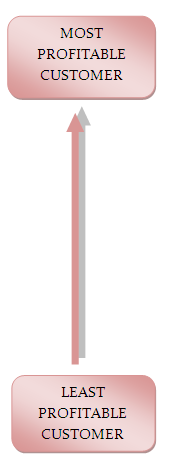Customer Relationship Management: Customer Relationship Management (CRM) is a broad term that covers concepts used by companies to manage their relationships with customers, including the capture, storage and analysis of customer, vendor, partner, and internal process information. Customer relationship management tools include software and browser-based applications that collect and organize information about customers. For instance, as part of their CRM strategy, a business might use a database of customer information to help construct a customer satisfaction survey, or decide which new product their customers might be interested in.

![]() Platinum: This is segment or retailers customers with the top 25% LTV (Lifetime Customer Value ).These are the most loyal customers who are not overly concerned about merchandise price & place more value on customer service.
Platinum: This is segment or retailers customers with the top 25% LTV (Lifetime Customer Value ).These are the most loyal customers who are not overly concerned about merchandise price & place more value on customer service.
![]() Gold: Next 25% of customers in terms of their LTV make up the Gold Segment.These have low LTV then Platinum customers because they are more price sensitive.
Gold: Next 25% of customers in terms of their LTV make up the Gold Segment.These have low LTV then Platinum customers because they are more price sensitive.
![]() Iron: Customers of the in the third tier probably do not deserve much special attention from the retailer due to their modest LTV.
Iron: Customers of the in the third tier probably do not deserve much special attention from the retailer due to their modest LTV.
![]() Lead: Customers in the lowest segment can cost the company money.They often demand a lot of attention what do not buy much from the retailer.
Lead: Customers in the lowest segment can cost the company money.They often demand a lot of attention what do not buy much from the retailer.
Benefits Of CRM-
![]() CRM processes that help identify and target their best customers, generate quality sales leads, and plan and implement marketing campaigns with clear goals and objectives.
CRM processes that help identify and target their best customers, generate quality sales leads, and plan and implement marketing campaigns with clear goals and objectives.
![]() CRM processes that help form individualized relationships with customers (to improve customer satisfaction) and provide the highest level of customer service to the most profitable customers.
CRM processes that help form individualized relationships with customers (to improve customer satisfaction) and provide the highest level of customer service to the most profitable customers.
![]() CRM processes that provide employees with the information they need to know their customers' wants and needs, and build relationships between the company and its customer.
CRM processes that provide employees with the information they need to know their customers' wants and needs, and build relationships between the company and its customer.
Tasks covered in this section
![]()
Customer Relationship Management |
|